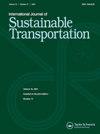How consumers’ emotions about transport policies shape their adoption of sustainable transport
IF 3.9
3区 工程技术
Q2 ENVIRONMENTAL STUDIES
International Journal of Sustainable Transportation
Pub Date : 2025-07-03
DOI:10.1080/15568318.2025.2510414
引用次数: 0
Abstract
Policymakers are increasingly implementing transport policies to encourage sustainable transport behaviors. However, research on how these policies influence the adoption of sustainable transport remains limited, particularly from the individual consumer’s perspective. This study examines how consumers’ emotional acceptance of transport policies—specifically, the anticipated pride and guilt-relief associated with the policies shape their intention to adopt sustainable transport. Using the case of Sweden’s environmental transport policy aimed at achieving fossil fuel independence by 2030, we surveyed 342 adults and analyzed the data using structural equation modeling. Our findings reveal that emotional acceptance of the policy significantly increases the likelihood of adopting sustainable transport (i.e. willingness to adopt an alternative fuel vehicle). Policy-related emotions enhance individuals’ perceptions of the policy’s effectiveness and foster greater support, which in turn promotes the adoption of sustainable transport options. These insights offer valuable guidance for policymakers: by complementing structural measures (such as subsidies and infrastructure investments) with communication strategies that evoke positive emotional responses, it is possible to strengthen public support for environmental transport policies and accelerate the uptake of sustainable transport.
消费者对交通政策的情绪如何影响他们对可持续交通的采用
决策者正在越来越多地实施交通政策,以鼓励可持续的交通行为。然而,关于这些政策如何影响采用可持续运输的研究仍然有限,特别是从个人消费者的角度来看。本研究考察了消费者对交通政策的情感接受——特别是与政策相关的预期自豪感和负罪感缓解——如何塑造他们采用可持续交通的意愿。以瑞典旨在到2030年实现化石燃料独立的环境运输政策为例,我们调查了342名成年人,并使用结构方程模型分析了数据。我们的研究结果表明,对政策的情感接受显著增加了采用可持续交通的可能性(即采用替代燃料汽车的意愿)。与政策相关的情绪增强了个人对政策有效性的认知,并促进了更大的支持,这反过来又促进了可持续交通选择的采用。这些见解为政策制定者提供了宝贵的指导:通过将结构性措施(如补贴和基础设施投资)与引起积极情绪反应的沟通策略相辅相成,有可能加强公众对环境运输政策的支持,并加速可持续交通的采用。
本文章由计算机程序翻译,如有差异,请以英文原文为准。
求助全文
约1分钟内获得全文
求助全文
来源期刊
CiteScore
8.90
自引率
2.60%
发文量
56
期刊介绍:
The International Journal of Sustainable Transportation provides a discussion forum for the exchange of new and innovative ideas on sustainable transportation research in the context of environmental, economical, social, and engineering aspects, as well as current and future interactions of transportation systems and other urban subsystems. The scope includes the examination of overall sustainability of any transportation system, including its infrastructure, vehicle, operation, and maintenance; the integration of social science disciplines, engineering, and information technology with transportation; the understanding of the comparative aspects of different transportation systems from a global perspective; qualitative and quantitative transportation studies; and case studies, surveys, and expository papers in an international or local context. Equal emphasis is placed on the problems of sustainable transportation that are associated with passenger and freight transportation modes in both industrialized and non-industrialized areas. All submitted manuscripts are subject to initial evaluation by the Editors and, if found suitable for further consideration, to peer review by independent, anonymous expert reviewers. All peer review is single-blind. Submissions are made online via ScholarOne Manuscripts.

 求助内容:
求助内容: 应助结果提醒方式:
应助结果提醒方式:


